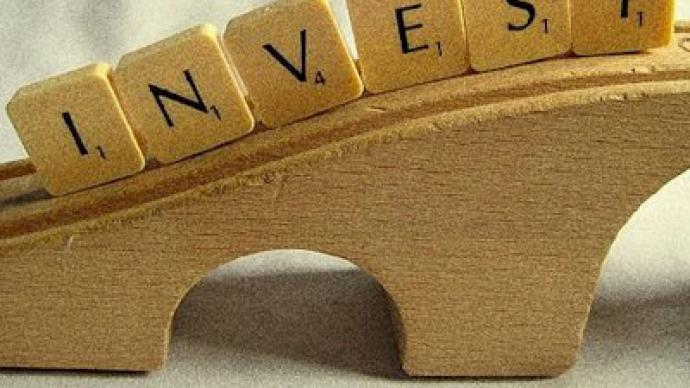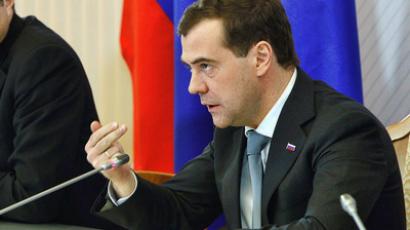State companies to feel impact of Medvedev call in investment climate

New rules for Russian State companies have been spelled out by President Medvedev who says regulation needs to be significantly improved to help the country's investment climate.
“In order to reduce the influence of state companies on the investment climate we need to do 3 things. First of all to publicize the schedule of state companies privatization for the next 3 years. Then to eliminate practices when Government Ministers hold positions on the board of directors in competitive companies. And thirdly state companies need to establish a procedure of publicizing planned procurements, including prices and information about contracts.”Business RT spoke with Jacob Nell, Chief Economist at Morgan Stanley Russia, about Russia’s investment climate and its perception with global investors.RT:We've just heard from President Medvedev about his proposal to encourage private international investors, how effective do you think these steps will really be?JN:“I think it is a great direction of travel.In Davos earlier this year he set out a ten point programme of substantial measures to improve the investment climate in Russia. And now he has come up with another ten points.That’s good, they are good sensible measures, by and large.But I think there will still be some questions about how quickly he will implement them, how effective they will be, and I think that, because there is such a high level of skepticism, among international investors about Russia, that they will want to see concrete signs of progress in delivery of this agenda before you see a large increase in investment inflows.” RT:Is that like breaking down bureaucracy barriers? Because obviously that’s what private investors are going to be concerned about.JN:“Well I would pick out maybe 2 or 3 of the measures as being things which can really move the needle.So the first thing I think is this direct investment fund, which we don’t know all the details – it is going to be announced at St Petersburg Economic forum later this year – but it’s going to take a minority stake in big projects.And because it takes a stake and because it is a government owned, but privately managed, fund, I think there will be a higher level of security for investors.They will see that political risk is reduced, much as when EBRD or IFC take a position in a project, it reduces risk for international investors.So I think that it is plausible that that will leverage investment in key projects.That’s one point.” RT:Do you think investors will actually start investing in Russia? Because, as you say, there is skepticism.Do you see a timeline of when these steps will be implemented?JN:“Well I think that would be great.I think he has set out the beginnings of a timeline.If he comes out every three months with another ten point plan of different points, that will lose credibility eventually.So I think what he needs to do is to take out some of the more minor measures, clarify some of the larger measures and set out a clear plan of milestones.I think that will be more persuasive, but people will be waiting to see results before they start to invest in large scale.The other thing to point is, at the moment, international investors are putting money into Russia.High oil prices, as you’d expect, people see that things are improving and they are starting to put some money in.Not big flows, but unlike all other emerging markets there is positive flows into Russia at the moment. The people that are taking money out are Russians, and that probably will change after the presidential election next year.So I think that we could see a big pickup in investment, as President Medvedev wants to see, after the uncertainty associated with the Presidential elections is over.”RT:Medvedev also called for these companies to be more transparent, so that potentially the shareholders, minority shareholders even, could actually see the activities.Do you think this could actually be implemented?JN:“Well I was very interested to see Transneft publish, earlier this week, a whole bunch of data about tariffs that they had not published before.And I wonder if that was because of the campaign that (Alexey) Navalny is conducting on behalf of minority shareholders to release information about Transneft, or whether it was an indirect response to the Navalny court case that is now going on, following his release of this report about misappropriation of funds building a big pipeline to the Pacific.So, that’s a big change I think.And if that is a sign of greater disclosure by State owned companies, along with the other measures to take the Ministers off the Boards, and to privatize larger shares in them, I think it could lead to a step change in their performance and in their share price.”














